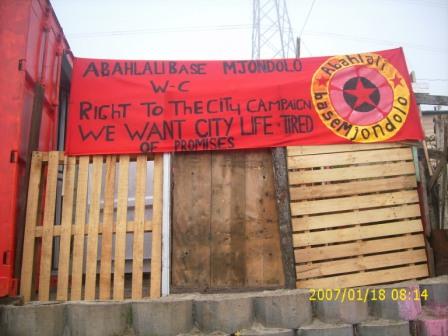Claiming the Right to the City Contesting Forced Evictions of Squatters in Cape Town during the run-up to the 2010 World Cup
Abstract
South Africa is after Brazil the most unequal society of the world. Despite the fact that many South Africans still life in shacks below poverty line, the South African government has spent billions of rand on hosting a world class event, namely the FIFA World Cup, which is only accessible to a small and rich segment of society. Although the 2010 FIFA World Cup was a great success according to the South African government and FIFA, it had no benefits for the majority of the country, the poor.
In this thesis, attention is given to the negative socio- and spatial impacts 2010 had on the lives of squatters in the City of Cape Town, one of South Africa‘s cities that hosted the World Cup. More specifically, this thesis focuses on one of the contested spaces in Cape Town, namely the Athlone practice stadium, from where squatters have faced evictions and relocations to the Symphony Way Temporary Relocation Area, known to many as “Blikkiesdorp”(Afrikaans for ?Tin Can Town?), located in the outskirts of the city.
Via the use of diverse social science research methods and techniques, such as participant observation, semi-structured interviews, informal interviews, focus group and qualitative document analysis, a holistic perspective is given on the anti-eviction struggles of squatters and their claims to the Right to the City.
This thesis explores how this notion of the Right to the City is represented through the strategies, forms and outcomes of the collective actions of these squatters from Athlone and shows how these local struggles are intertwined with city-wide struggles for houses and even with international anti-eviction struggles via transnational advocacy networks. Furthermore, this thesis not only contributes to the political and scientific debates concerning struggles for the Right to the City, but also contributes to the existing knowledge on the forms, opportunities and challenges of anti-eviction struggles of squatters that are based on principles of non-hierarchy, self-organisation, direct democracy and mutual aid. It further made clear that in South Africa, as well as in other developing countries, institutional and environmental opportunities and constraints surrounding urban social movements and squatter communities in society, such as the limited space for negotiation in the political structures for (poor) residents, oppressive governments and limited resources, are important factors that influence and determine the scope for social resistance.
Key words: Squatters, Urban Social Movements, Evictions, Social Resistance, The Right to the City and FIFA World Cup.

